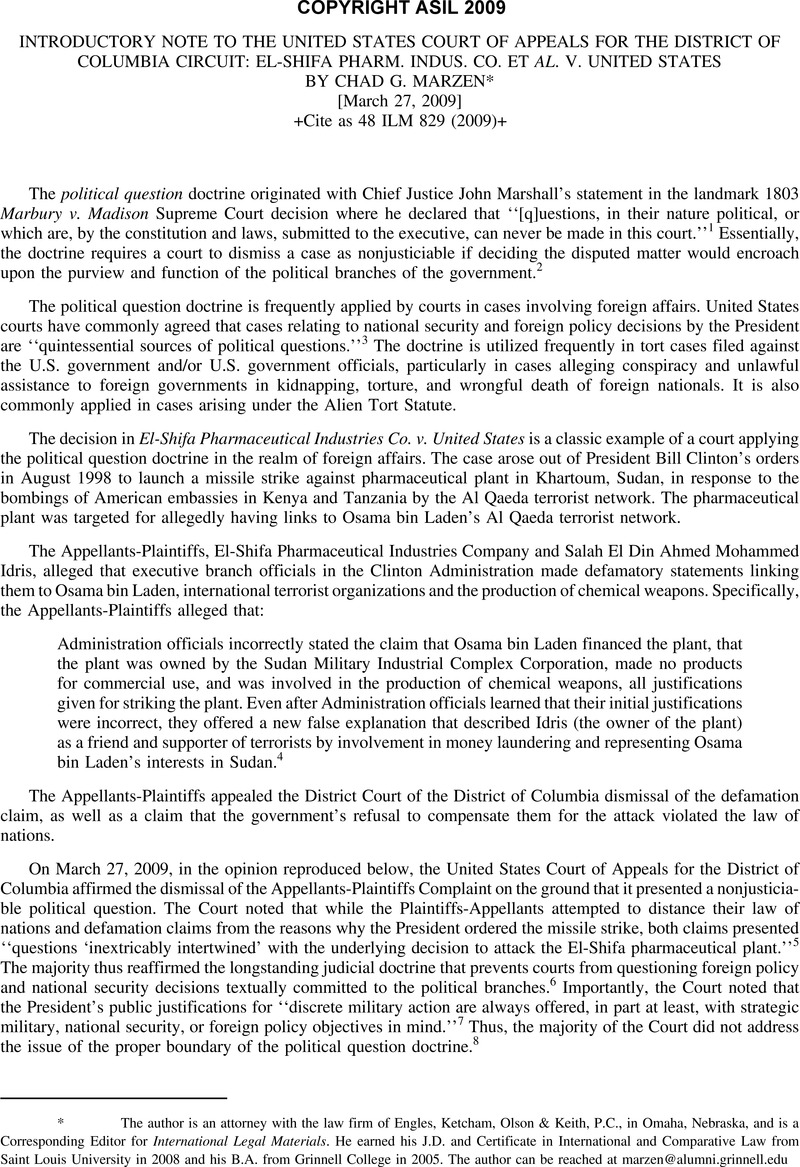No CrossRef data available.
Published online by Cambridge University Press: 27 February 2017

* This text was reproduced and reformatted from the text available at Public Access to Court Electronic Records (PACER) website: (visited August 17, 2009) <http://pacer.cadc.uscourts.gov/common/opinions/200903/07-5174-1172578.pdf.
1 Marbury v. Madison, 5 U.S. (1 Cranch) 137, 170 (1803).
2 Kimberly Breedon, Remedial Problems at the Intersection of the Political Question Doctrine, the Standing Doctrine, and the Doctrine of Equitable Discretion, 34 Ohio N.U.L. Rev. 523 (2008).
3 Bancoult v. McNamara, 445 F.3d 427, 433 (D.C. Cir. 2006).
4 El-Shifa Pharm. Indus. Co. v. United States, 559 F.3d 578, 581 (D.C. Cir. 2009).
5 Id. at 583.
6 The majority cited several cases which stand for this proposition, including: Gonzalez-Vera v. Kissinger, 449 F.3d 1260, 1263-1264 (D.C. Cir. 2006) (dismissing a suit concerning alleged unlawful U.S. assistance to the Pinochet regime because the challenged actions “‘were inextricably intertwined with the underlying’ foreign policy decisions constitutionally committed to the political branches ); Harbury v. Hayden, 522 F.3d 413, 420 (D.C. Cir. 2008) (dismissing a suit against American officials alleged to have unlawfully conspired with the Guatemalan army because it sought a “determination whether the alleged conduct should have occurred, which impermissibly would require examining the wisdom of the underlying policies”); Bancoult v. McNamara, 445 F.3d 427, 436 (D.C. Cir. 2006) (dismissing a suit challenging the tactical measures allegedly taken in depopulating island territories to build a naval base because the measures were “inextricably intertwined” with an exercise of “the foreign policy and national security powers entrusted. . .to the political branches”); Schneider v. Kissinger, 412 F.3d 190, 194-195 (D.C. Cir. 2005) (dismissing a suit alleging that the United States assisted in the kidnapping, torture, and death of a Chilean general during the Cold War because it challenged a foreign policy decision textually committed to the political branches).
7 El-Shifa, 559 F.3d at 585.
8 Id.
9 Id. at 592.
10 Id. at 590.
11 See, e.g., Rachel E. Barkow, More Supreme than Court? The Fall of the Political Question Doctrine and the Rise of Judicial Supremacy, 102 Colum. L. Rev. 237 (2002).
12 El-Shifa, 559 F.3d at 586.
1 We disagree with our dissenting colleague’s conclusion that the law of nations claim has been forfeited. See Dissenting Op. at 3. Plaintiffs fully brief the claim challenging the CIA’s failure to compensate, which the district court also addressed, and so it must be addressed here. The dissent assumes that the law of nations claim replicates the abandoned claim that the attack was unjustified. That reasoning mistakenly conflates the concepts of claims and issues. The claim in the challenge to the attack was that plaintiffs were entitled to a declaratory judgment that the President was wrong to order the strike (Claim 1). That claim has been forfeited. The law of nations claim is that plaintiffs are entitled to a declaratory judgment that the CIA wrongfully refused to compensate plaintiffs (Claim 2). An issue in Claim 2 is whether the President unjustifiably ordered the strike, for if the attack was justified no compensation was due. The question presented in Claim 1 is also an issue in Claim 2. The dissent wrongly concludes that because Claim 1 is forfeited and because it raises an issue in Claim 2, Claim 2 is also forfeited. Claim 1 challenged an action by the President, whose sovereign immunity is not waived by the Administrative Procedure Act (APA). By contrast, Claim 2 challenges the action of a federal agency whose sovereign immunity is waived by the APA, 5 U.S.C. § 702 (2006). Crucially, the relief requested in Claim 1 ran against the President, while in Claim 2 it runs against the CIA. Although judicial review of Claim 2 may require review of an issue presented in Claim 1, Claim 2 is not barred by sovereign immunity and is properly before us.
2 According to the dissent, Idris can avoid dismissal here by stating that the President’s justifications for the missile strike were made not in furtherance of national security or foreign policy, but merely to avoid public embarrassment. See Dissenting Op. at 7–8. Implicit in the dissent’s argument on this point is a suggestion, which we reject, that plaintiffs can avoid the political question bar at the motion to dismiss stage by artful pleading that recasts the terms of a dispute to make it one properly reviewed by courts.
3 The dissent assumes that we find decisionmaking in these fields exclusively within the President’s Commander-in-Chief authority. See Dissenting Op. at 9–11. We express no such opinion. Rather, we simply rest our holding on the proposition that the conduct of our foreign relations is committed to the political departments, “and the propriety of what may be done in the exercise of this political power is not subject to judicial inquiry or decision,” Oetjen, 246 U.S. at 302.
4 Parhat, 532 F.3d at 839 (citing the Detainee Treatment Act, section 1005(e)(2)(A) of which gives this court “exclusive jurisdiction to determine the validity of any final decision of a Combatant Status Review Tribunal that an alien is properly detained as an enemy combatant”).
5 Chai, 466 F.3d at 128–29 (citing 8 U.S.C. § 1189(c) (2006), which allows an entity designated as a terrorist organization under the Antiterrorism and EffectiveDeath Penalty Act to seek judicial review in this court).
6 Von Zedtwitz, 26 F.2d at 153–54 (citing the Trading with the Enemy Act, section 9(a) of which provides for judicial review of certain seizures of property).